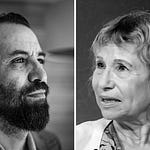Our call this week will be at a special time: Wednesday at 11 AM Eastern
Our guest will be Trita Parsi, executive vice president of the Quincy Institute and one of the most thoughtful and best-informed observers in Washington about the relationship between Israel, Hezbollah and Iran. We’ll discuss Israel’s recent attack, US policy and the danger of a regional war.
Paid subscribers will get the link this Tuesday and the video the following week. They’ll also gain access to our library of past Zoom interviews with guests like Rashid Khalidi, Thomas Friedman, Ilhan Omar, Omar Barghouti, Benny Morris, Noam Chomsky, and Bret Stephens.
We’ve added a new membership category, Premium Member, which is $179 per year (or higher, if you want to give more). In addition to our weekly Zoom interviews, Premium Members will get access to a monthly “ask me anything” zoom call.
Our first “ask me anything” will be this Thursday, August 29 at 11 AM Eastern. Premium Subscribers will get a Tuesday email that includes links to both our Wednesday call with Trita and the “ask me anything” on Thursday. (If you have any questions, email me).
If you’re interested in becoming a premium or regular member, hit the button below.
We’re also slightly increasing the prices of regular paid subscriptions. It’s the first time I’ve done this since I launched the newsletter a few years ago. Starting September 1, regular subscriptions will be $79 per year (up from $72) and $7.99 per month (up from $7). This will apply to all new subscriptions and to everyone whose subscription renews. If this increase creates a hardship for you, email me and we’ll figure it out.
Sources Cited in this Video
The cancellation of Joshua Leifer’s book launch event.
A poster calls for “Zionists” to leave a London neighborhood.
Mira Sucharov’s study of what American Jews mean by the word “Zionist.”
Things to Read
(Maybe this should be obvious, but I link to articles and videos I find provocative and significant, not necessarily ones I entirely agree with.)
In the Jewish Currents (subscribe!), Maya Rosen investigates the Israelis who want to settle southern Lebanon.
Ta-Nehisi Coates and Jon Stewart on the exclusion of Palestinian speakers at the DNC.
A Black and Palestinian Mississippian reflects on the Democratic conventions of 1964 and 2024.
Benjamin Netanyahu never pays the bill.
Please consider supporting a scholarship fund for displaced students in Gaza who want to study in the US.
See you on Wednesday at 11 AM,
Peter
VIDEO TRANSCRIPT:
Hi. There was a fair amount of attention last week to the experience of my friend, Josh Leifer, who’s launch event for his excellent new book, Tablets Shattered, was closed because the bookstore wouldn’t permit him to be speaking alongside a moderator who was a ‘Zionist’ rabbi. It produced a lot of commentary. And I do think this is something which is growing as a tendency, this tendency to say that if you are a Zionist, then you are kind of excluded from conversations. There was even a thing that happened in the UK where there was a march, which said that Zionists had to leave a certain neighborhood in London.
I wanna explain why I think this is self-defeating and unwise. The first reason is that Palestinians, and Jews who support Palestinian freedom, have been excluded from a very, very long time, and still are, sometimes even by force of law. And the argument against that is that these are restrictions on free speech, and that people should have the right to be heard, and to make their case. So, this is what many of us have argued about: the rights of, you know, Jews who don’t support a Jewish state to speak at Hillel, for instance, or the rights of Palestinians to express their point of view and not be called antisemites just because they don’t support a Jewish state.
And I do think you undermine the clarity of that argument when people on the Left turn around and then basically say, Zionists are not allowed to have a platform in our spaces, right? I think it undermines the effort, the really important effort to say that in other spaces, whether they’re establishment Jewish spaces or kind of more mainstream American political spaces, that Palestinians—the vast majority of whom, of course, don’t support the idea of a Jewish state, or other people who don’t support a Jewish state—should have the right to speak, right. That was something that tragically didn’t happen at the Democratic National Convention. But I think it makes it harder to make that case if you’re excluding people on your own turf.
Secondly, I of course understand the logic, which would say, well, Zionism is the ideology of the state. This state is classified as an apartheid state by a lot of human rights organizations. It’s therefore racist ideology, and we wouldn’t have, you know, white supremacists come and speak in our bookstores, or whatever. But I think there are some important differences, and some problems with that logic.
The first is that for many Jews, Zionism has an intimate, and often somewhat vague, meaning, which does not actually line up with supporting the actions of the state, and sometimes doesn’t even actually line up with supporting Jewish statehood at all. There is a tradition of cultural Zionism, which opposed the Jewish state. And, even among people who have never heard of cultural Zionism, what Mira Sucharov’s polling has found, which is really fascinating, is that American Jews define themselves as Zionists under certain definitions. But if you tell American Jews that Zionism means a state in which Palestinians are not treated equally to Jews, then they actually say they’re not Zionists.
So, the point is that the discourse in the Jewish community about what Zionism means can often be quite different than I think what it is on the Left. And I’m not saying that the Jewish one is right. It’s understandable that people on the Left would say, Zionism is what Israel does. But I think when you close down conversations with Jews for whom Zionism means essentially a kind of an affinity, a connection with that place, with those people, but who haven’t actually necessarily grappled that much with the contradictions of the principles of equality and liberal democracy, those are in some ways, I think, the very people that you want to be in conversation with if you’re trying to change the American debate, trying to change the American Jewish debate.
Because what Mira Sucharov’s polling shows is that when you confront people who call themselves Zionists with the reality that Israel is fundamentally unequal under law towards Palestinians, that actually many of them rethink their perspective and may even rethink the term Zionist and whether it applies to them. So, do you really want to not give the opportunity to have those conversations? I think that we are in a moment—it’s been true for quite a long time, but especially now—in which people who are making a critique of the idea of Jewish statehood based on the idea of equality under the law, based on the idea that ethnonationalism, tribal supremacy, is wrong in Israel-Palestine, and just like it’s wrong in the United States, like it’s wrong in France, like it’s wrong in Hungary, like it’s wrong in India, those people have a very powerful argument.
And the more they can get into those discussions with people who have been raised to believe in the idea of a Jewish state, but have not necessarily thought a lot about what a Jewish state means from—as Edward Said famously said—from the standpoint of its victims, those conversations, I actually think, can be extremely productive in terms of changing debate inside the American Jewish community and changing debate inside the United States as well. And when you basically say, no Zionists are allowed in that conversation, I actually think you’re forfeiting a chance to make change. And what you end up doing is basically just making people become very alienated and very angry. And that exclusion doesn’t, I think, actually move one towards a shift in the public conversation at all.











Share this post